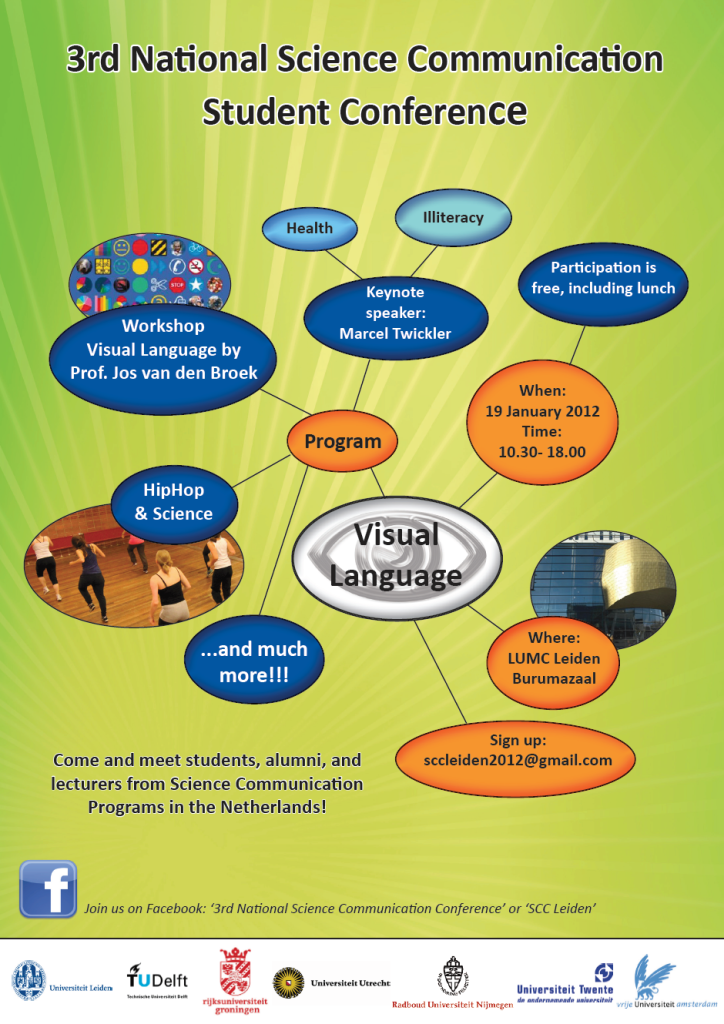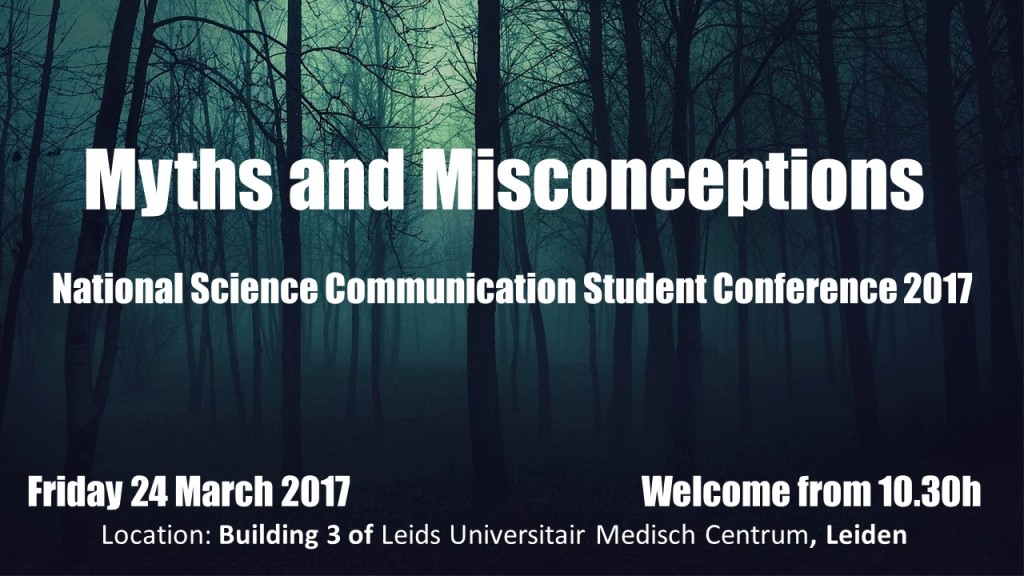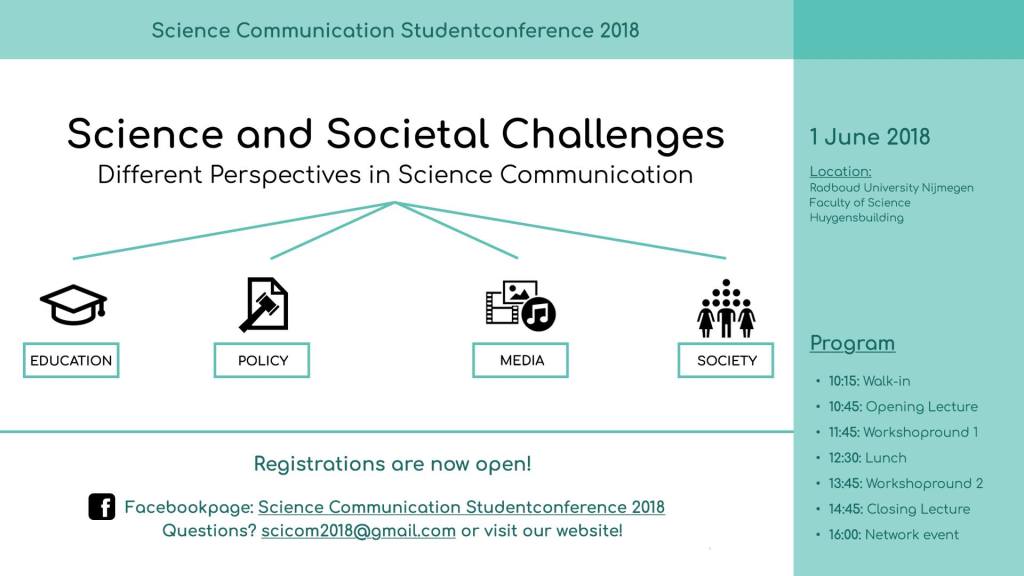This year the 13th edition of the Science Communication Student Conference will be organized. Every year another university is organizing this event. It started with an afternoon conference, but this 13th edition is a whole day of Science Communication! Learn a bit more on the small history of the conference. As you will notice, some information is missing. If you have that information or you still have posters, please let us know and we will keep this up-to-date!
2009
The first Science Communication Conference took place in 2009 in Utrecht. It started as a small initiative. The conference had an afternoon program.
2011

The second Science Communication Conference was organized by Utrecht University and TU Delft. Christine Critchley was invited as the keynote speaker in Utrecht.
2012

In 2012 Leiden University organized the third Conference. The theme was “Visual Language“.
2013, 2014 & 2015
For the years after that some posters are missing, but some knowledge is still there! In 2013 the conference was organized by the VU in Amsterdam. In 2014 the conference took place in Groningen and was organized by RUG. In 2015 the focus was on professional learning communities. This conference was organized by TUD in collaboration with SciCom NL.
2016
In 2016 the theme of the conference was “Grand Challenges and Sustainable Development Goals”. This seventh edition of the conference was organized by UU. That day started with a round of ‘Ignite presentation’ were every involving university gave a presentation. The universities had a presentation of 20 slides and 15 seconds for every slide to explain what the unique selling points were of their Master’s programme in Science Communication. Furthermore, the universities talked about how their university was connected to the theme of the year. After lunch the participants could follow workshops and the day ended with a closing lecture of Ionica Smeets.
2017

In 2017 Leiden University organized the student conference. The theme of the day was “Myths and Misconceptions”. The day started with a lecture of Pedro De Bruyckere who argued that it is hard to fight Myths. There are a couple of reasons for that, but one he mentions is the fact that some myths sounds logical and seem to be true. Also in this year’s edition participants could follow a round of workshops. A nice new touch of this year: speed dating with organizations and companies.
2018

The theme in 2018 was “Science and its societal challenges: different perspectives in science communication” and organized by RU in Nijmegen. The day started with a keynote lecture of Noelle Aarts followed by a round of workshops with the focus on either education, media policy or society. Also Eric Jensen from the University of Warwick gave a keynote lecture on the importance of evaluation in science communication. The day ended with a network event where students had the opportunity to meet professionals in the field of science communication.
2019
The VU in Amsterdam organized the conference in 2019. The theme chosen for this year was “Transform”. They stated: “The science communication field is continuously transforming (from deficit to dialogue, and more).This transformation reflects continuous societal transformations (sustainable innovation, technological revolution, cultural blending, etc.).”
The day started with a general meeting. Students from all the universities prepared a clip of two minutes in the form of an elevator pitch. In this pitch they told what Science Communication meant to their university and what their master program looks like. After that there were rounds of workshops where students could experience how they can equip themselves for the transformation in the Science Communication field. After two rounds of workshops “the big science communication simulation game” took place. The day ended with drinks and a speed dating service.
2020
The theme of the Science Communication Conference in 2020 was “Science communication to tackle sustainability challenges”, which was organized by Wageningen University and Research. As of March that year the coronavirus hit the Netherlands, this 11th edition of the conference took place online in the form of a Webinar. The programme started off in the morning of the first of May and consisted of a keynote lecture as well as interactive workshops in breakout rooms and a closing panel discussion. Professor Phil Macnaughten, from the University of Wageningen itself, gave the keynote lecture named ‘the challenge of science communication for sustainability – a responsible innovation approach’. After the keynote lecture there were several workshops related to sustainability challenges. The day ended with a panel discussion that consisted of Arne Hendriks (WUR), Lurissa den Dulk (Extinction rebellion; WUR) and Phil Macnaughten (WUR).
2021
The 2021 Science Communication Conference was all about the job market in science communication, and gave a broad look into the myriad of things science communicators can do. It was an afternoon programme organised by the University of Groningen, and because we were still going in and out of lockdowns, the conference was held online. Sophie Duncan, a UK based public engagement professional, was the keynote speaker and she talked about the many ways in which we can involve everyone in science. After that, there were two rounds of workshops on everything from science shops to citizen science and from research into science communication to podcasts. We ended the day with a fun pubquiz for everyone.
2022

After two online editions, the Science Communication Conference 2022 was organised by and took place live at Utrecht University. The theme was Science Communication & (Social) Media: Engage with the world. After the keynote lecture given by Edwin Pos about how to achieve mutual trust between scientists, science communicators and the public, participants attended two rounds of workshops from speakers such as Salwa van der Gaag (NOSop3), Janette Bessembinder (KNMI), Kevin Kosterman and Marlies Hilhorst-Verheij (RIVM). Following this, there was a panel discussion with the Sisters in Science, Jon Chase and Onur Șahin about inclusivity in science. The day ended with a ‘borrel’ where people could chat with several alumni!
